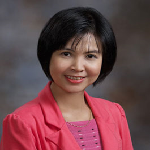Scientific Program

P Klainin-Yobas
National University of Singapore, Singapore
Biography:
Piyanee Yobas is currently working as Associate Professor an academic staff at Alice Lee Centre for Nursing Studies, National University of Singapore. She graduated from Mahidol University, Thailand. She has received her Master and PhD degree from Frances Payne Bolton School of Nursing, Case Western Reserve University, USA. Her research interests are: a) stress and health; and b) psychosocial interventions among healthy participants and people with medical and mental disorders.
Abstract
Cancer survivors face multiple challenges associating with cancer and its treatments. They experience ongoing physical symptoms requiring frequent visits to healthcare providers and report stress disorders, depression, and anxiety. There is a need to help cancer survivors manage their physical symptoms and preventing the psychological symptoms. Evidence showed that mindfulness interventions could be used to achieve such goals. However, most interventions entail general information concerning mindfulness practice and knowledge specifically tailored for cancer survivors is not emphasized. We developed the four-week mindfulness-based group psychoeducation program for cancer survivors [the MindCAN program] based on existing empirical evidence. This program aimed to help participants learn to manage physical symptoms and negative emotions associating with cancer. The four-session included mindfulness management of your stress, b) Mindful body sensations, c) Mindful emotions: Calmness and composure, and d) Mindfulness: The powerful mind. Each session lasted 90 minutes, comprising the education components and the practice of mindfulness. We offered the program to cancer survivors at a tertiary hospital in Singapore as a free service. Four groups were offered from June 2017 to March 2018 and twelve participants attended the groups. Most participants provided positive evaluations toward the objective, content, and duration of the program. They also commented that the program was easy to understand and useful. Based on such positive evaluation, we then continue to offer the free program to participants. Next, we will initiate a research project to properly test the effectiveness of the program.
Reference:
- Blaes A H etal., (2016). Mindfulness-based cancer recovery in survivors recovering from chemotherapy and radiation. The journal of Community and Supportive Oncology, 14(8):351-358.
- Brown K W, Ryan R M. (2003). The Benefits of Being Present: Mindfulness and Its Role in Psychological Well-Being. Journal of Personality and Social Psychology, 84(4): 822-848.
- Kabat-Zinn J. (2013). Full Catastrophe Living: Using the Wisdom of Your Body and Mind to Face Stress, Pain, and Illness. New York: Bantam Dell.
- Nursing Education and Research
- Evidence-Based-Clinical Practice
- Evidence Based- Non Clinical Practice
- Reproductive Health Nursing
- Cancer Nursing
- Mental Health Nursing
- Surgical Nursing
- Cardiac Nursing
- Orthopedic Nursing
- Men Nursing
- Holistic Nursing
- Midwifery and Pediatric Nursing
- Environmental Health and Veterinary Nursing
- Clinical and Community Nursing
- Critical Care and Emergency Nursing
- Anaesthesia and Transitional Care Nursing
- New Technologies in Nursing Education
- Nursing Informatics & Nursing Management
- Forensic and Legal Nursing

